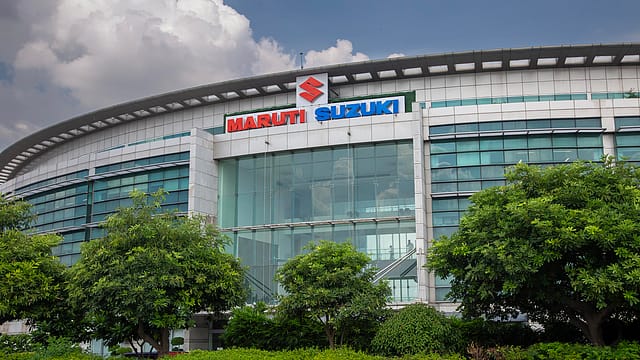Maruti Suzuki shares race 7% as UP waives registration fee on hybrid cars
ADVERTISEMENT

Shares of Maruti Suzuki India Ltd soared 7% in intraday trade on Tuesday after media reports claimed that the Uttar Pradesh government has waived registration fee on hybrid cars, bringing them on par with electric vehicles in fee exemptions.
Uttar Pradesh currently charges 10% registration fee or road tax for vehicles costing over ₹10 lakh.
The stock of India’s largest carmaker opened at ₹12,205.05 against its previous closing price of ₹12,026. The counter rose over 7% to hit a high of ₹12,875 on the BSE, taking Maruti Suzuki’s market cap to over ₹4 lakh crore.
Maruti Suzuki currently sells only two hybrid cars — sport utility vehicle Grand Vitara and multi-purpose vehicle Invicto — both sourced from Suzuki's global partnership with Toyota.
In India’s passenger vehicle market, Japan’s Honda Cars and Toyota Kirloskar Motor are two major players in hybrid vehicles.
While hybrid cars have existed in India for a decade and half with Honda City being the first model in 2008, they recently started outselling EVs as lack of charging infrastructure and range anxiety prompted car buyers to opt for hybrids.
Fortune India earlier reported that Japanese carmaker Suzuki Motor Corporation is working on low-cost hybrid technology that may enable smaller affordable cars to better their fuel economy. The cost of the technology that goes into making Toyota hybrids is still quite high and that's why the cost of the car becomes high, according to RC Bhargava, chairman of Maruti Suzuki India. "A lot of work is going on, particularly in Suzuki Japan, on evolving a better technology which will enable smaller cars to take advantage of the principles of hybridisation to improve fuel economy at a much more affordable cost. If that is aligned with a lower GST (Goods and Services Tax) also, you can look forward to small cars with much better mileage than what they have today," Bhargava said.
Hybrids continue to attract 43% duty compared to 5% GST on EVs.
The registration fee exemption comes at a time when homegrown automobile manufacturers Tata Motors and Mahindra & Mahindra have said that they see no reason for the government to offer tax sops for electric vehicles. There isn’t logic to incentivise hybrids as compared to a very strong logic to incentivise EVs, Mahindra & Mahindra CEO and managing director Anish Shah said in an analyst call after the company’s fourth quarter earnings. Governments around the world for the last 20 years haven’t incentivised hybrids because they are more expensive due to two powertrains and emissions are not really better than ICE, Shah said. “Hybrids still use a fair bit of fuel as compared to EVs where you’ve got zero emissions and zero fuel use.”
“EV is the endgame. Hybrids can be something that’s in between,” Shah said, adding if the consumer wants more hybrids, then Mahindra will be ready for that.
Echoing similar views, PB Balaji, Group chief financial officer of Tata Motors, said there has to be logic to the demand for tax benefits on hybrids which Tata Motors - India's largest electric carmaker - does not see.
“From a policy perspective, we see hybrids as a transition technology. So there is absolutely no business case for the government to drive hybrid sales,” Balaji said in an investor call. EVs are a fool-proof zero-emission technology, he added.